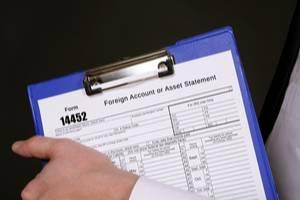Court Ruling May Result in Increased FBAR Penalties
 U.S. taxpayers who own foreign investments must meet certain requirements when reporting accounts and other assets to the IRS. A Report of Foreign Bank and Financial Accounts, commonly known as the FBAR, must be filed for each year in which a person has a financial interest in one or more accounts outside of the United States, and the aggregate value of these accounts is at least $10,000. Failure to report applicable accounts on an FBAR can result in significant penalties, and due to a recent court ruling, these penalties may be even higher for taxpayers who fail to report multiple accounts.
U.S. taxpayers who own foreign investments must meet certain requirements when reporting accounts and other assets to the IRS. A Report of Foreign Bank and Financial Accounts, commonly known as the FBAR, must be filed for each year in which a person has a financial interest in one or more accounts outside of the United States, and the aggregate value of these accounts is at least $10,000. Failure to report applicable accounts on an FBAR can result in significant penalties, and due to a recent court ruling, these penalties may be even higher for taxpayers who fail to report multiple accounts.
Appeals Court Addresses Non-Willful FBAR Penalties
A recent case heard by appellate judges in the Fifth Circuit addressed penalties for non-willful violations of the requirement to file an FBAR. Non-willful violations usually involve cases in which a taxpayer failed to file an FBAR or report one or more accounts because they were not aware of their requirements. The current maximum penalty for a non-willful violation is $12,921, and this amount is adjusted every year based on inflation.
Previously, courts that have addressed non-willful FBAR violations have applied the penalty on a per-year or per-form basis. That is, a single penalty would apply for each year in which a taxpayer failed to meet their requirements. However, the Fifth Circuit reviewed the applicable laws and determined that it would be more appropriate to apply the penalty on a per-account basis. This means that for each account that a person failed to report or reported incorrectly on an FBAR, they may face a separate penalty. For those with multiple accounts who failed to meet their requirements in multiple years, the penalties may add up quickly and total a much higher amount than had been previously applied.
While taxpayers who have foreign accounts may be able to meet their FBAR requirements going forward, they could still face penalties for any previous years in which they committed violations. To minimize the potential penalties, taxpayers can take steps to come into compliance with the IRS’s requirements. In many cases, the best option for doing so is through the IRS’s streamlined compliance program. By using the Streamlined Domestic Offshore Procedures or Streamlined Foreign Offshore Procedures, a taxpayer can certify that their violations were non-willful, and they will usually be subject to a lower penalty than in other cases involving FBAR violations.
Contact Our San Jose FBAR Violation Attorney
If you have any foreign accounts that you have not reported to the IRS, or if you are concerned about whether you may face penalties related to FBAR violations, John D. Teter Law Offices can help you determine how to address these issues. We will work to help you come into compliance with your tax-related requirements while minimizing the potential penalties you may face. Contact our San Jose, CA foreign tax compliance lawyer today at 408-866-1810.
Sources:
https://www.forbes.com/sites/timtodd/2021/12/08/5th-circuit-holds-non-willful-fbar-penalty-cap-is-per-account-not-per-form/?sh=197973437b12
https://www.irs.gov/businesses/small-businesses-self-employed/report-of-foreign-bank-and-financial-accounts-fbar









